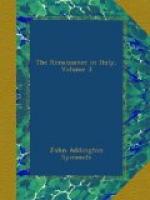It may be regretted that Cellini has not given a fuller account of the memorable sack of Borne. Yet, confining himself almost wholly to his own adventures, he presents a very vivid picture of the sad life led by the Pope and cardinals, vainly hoping for succour from Urbino, wrangling together about the causes of the tragedy, sewing the crown jewels into their doublets, and running the perils of the siege with common soldiers on the ramparts. When peace at last was signed, Cellini paid a visit to Florence, and found that his father and some other relatives had died of plague.[362] His brother Cecchino, however, who was a soldier in the Bande Nere of Giovanni de’ Medici, and his sister Liperata survived. With them he spent a pleasant evening; for Liperata having “for a while lamented her father, her sister, her husband, and a little son that she had been deprived of, went to prepare supper, and during the rest of the evening there was not a word more spoken of the dead, but much about weddings. Thus we supped together with the greatest cheerfulness and satisfaction imaginable.” In these sentences there is no avowal of hard-heartedness; only the careless familiarity with loss and danger, engendered by war, famine, plague, and personal adventures in those riotous times.[363] Cellini gladly risked his life in a quarrel for his friends; but he would not sadden the present by reflecting on inevitable accidents. This elastic temper permeates his character. His affections were strong, but transient. The one serious love-affair he describes, among a multitude of mere debaucheries, made him miserable for a few days. His mistress, Angelica, ran away, and left him “on the point of losing his senses or dying of grief.” Yet, when he found her again, a short time sufficed to satisfy his longing, and he turned his back with jibes upon her when she bargained about money.
It is worthy of notice that, at the same time, he was an excellent son and brother. His sister was left a widow with two children; whereupon he took them all into his house, without bragging about what appears to have been the best action of his life. In the same spirit he conscientiously performed what he conceived to be his duty to Cecchino, murdered by a musketeer in Rome. After nursing his revenge till he was nearly mad, he stole out one evening and stabbed the murderer in the back.[364] So violent was the blow that he could not extricate his dagger from the man’s spine, but had to leave it sticking in his nape. Next to his own egotism the strongest feelings in Cellini were domestic; and he showed them at one moment by charity to his sister’s family, at another by a savage assassination.




